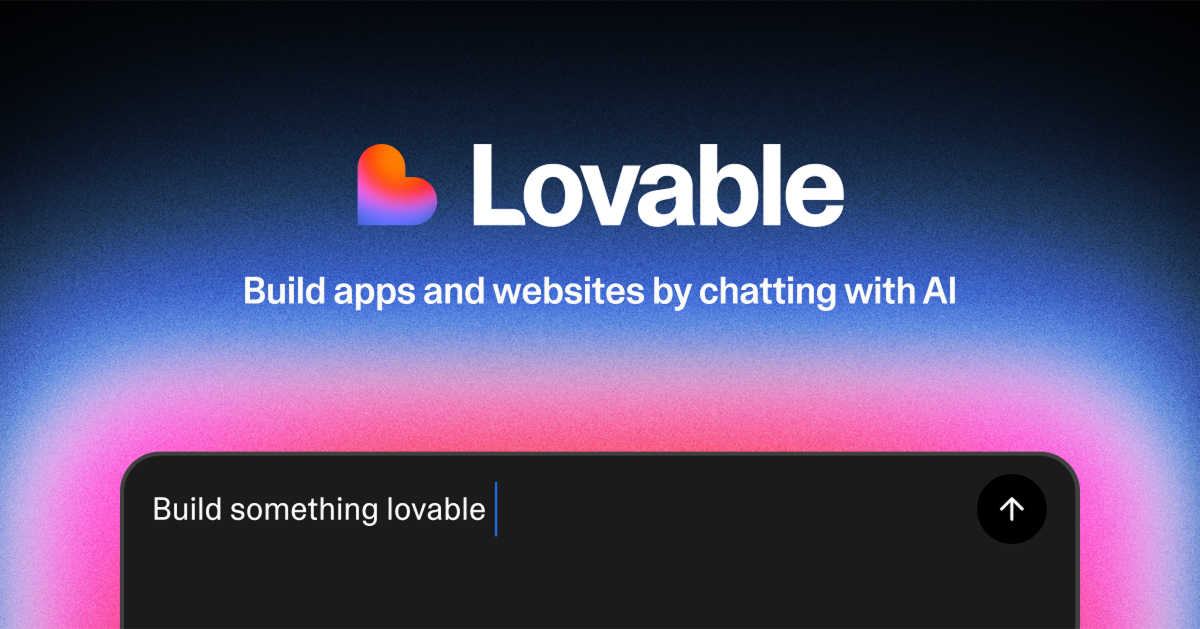Market intelligence tools are essential for businesses aiming to maintain a competitive edge.
With the global business intelligence market projected to grow from $23 billion in 2020 to over $33 billion by 2025, the demand for effective market intelligence solutions is undeniable (Quid).
These tools can accelerate decision-making processes by up to 5 times by providing actionable insights that businesses can leverage (Quid).
In this guide, we’ll explore the top 10 market intelligence tools available in 2024.
Whether you’re a small business seeking competitive analysis or a large enterprise aiming for data-driven decision-making, our research-backed list has you covered.
Key Takeaways:
- Market intelligence tools are crucial for competitive analysis and consumer insights.
- The integration of AI in these tools enhances their capabilities and user experience.
- Selecting the right tool can lead to significant improvements in business strategy and performance.
Our Top 10 Picks for Market Intelligence Tools
- Quid – Best for AI-powered analytics and consumer insights.
- Sprout Social – Best for social media monitoring and competitive intelligence.
- Semrush – Best for SEO and comprehensive competitive analysis.
- Similarweb – Best for web analytics and market insights.
- G2 – Best for user reviews and software comparisons.
- Statista – Best for extensive statistics across various industries.
- Knoema – Best for data visualization and discovery.
- NielsenIQ – Best for consumer behavior analytics.
- Google Market Finder – Best for identifying untapped global markets.
- Qualaroo – Best for gathering user feedback through surveys.
How We Evaluated Market Intelligence Tools
Our evaluation process for market intelligence tools focused on these key criteria:
- Usability: Tools must provide an intuitive user interface for ease of navigation and efficiency.
- Data Accuracy: The ability to provide reliable and accurate data is paramount.
- Integration Capabilities: Tools should easily integrate with existing systems and workflows.
- Customer Support: Robust customer service options enhance user experience and satisfaction.
- Cost-Effectiveness: Pricing should reflect the value provided, catering to different business sizes and needs.
In evaluating these tools, we conducted extensive online research, analyzed user reviews, and consulted industry experts to ensure our recommendations are both accurate and relevant.
Market Intelligence Tools Comparison Table
| Software | Best For | Key Features | Pricing | Free Plan | Platforms Available |
|---|---|---|---|---|---|
| Quid | AI-powered analytics | Data visualization, sentiment analysis | Contact for pricing | No | Web |
| Sprout Social | Social media monitoring | Competitive analysis, reporting | Starts at $89/month | Yes | Web, iOS, Android |
| Semrush | SEO and competitive analysis | SEO tools, keyword tracking | Starts at $119.95/month | Yes | Web |
| Similarweb | Web analytics | Traffic insights, audience analysis | Starts at $199/month | No | Web |
| G2 | User reviews and comparisons | Product discovery, user insights | Free | Yes | Web |
| Statista | Market statistics | Reports, data sets | Subscription-based | No | Web |
| Knoema | Data visualization | Data integration, analytics | Customized plans | No | Web |
| NielsenIQ | Consumer behavior analytics | Retail insights, trend analysis | Contact for pricing | No | Web |
| Google Market Finder | Identifying global markets | Market analysis, consumer insights | Free | Yes | Web |
| Qualaroo | User feedback collection | Survey tools, real-time insights | Starts at $80/month | No | Web |
1. Quid
Best for AI-powered analytics and consumer insights
Quid offers advanced AI-driven analytics that help businesses visualize data and gain insights into consumer behavior and market trends.
Its unique ability to analyze large datasets allows organizations to uncover hidden patterns and make informed decisions based on comprehensive insights.
Quid’s platform is particularly suited for industries that rely heavily on data analytics, such as marketing and product development.
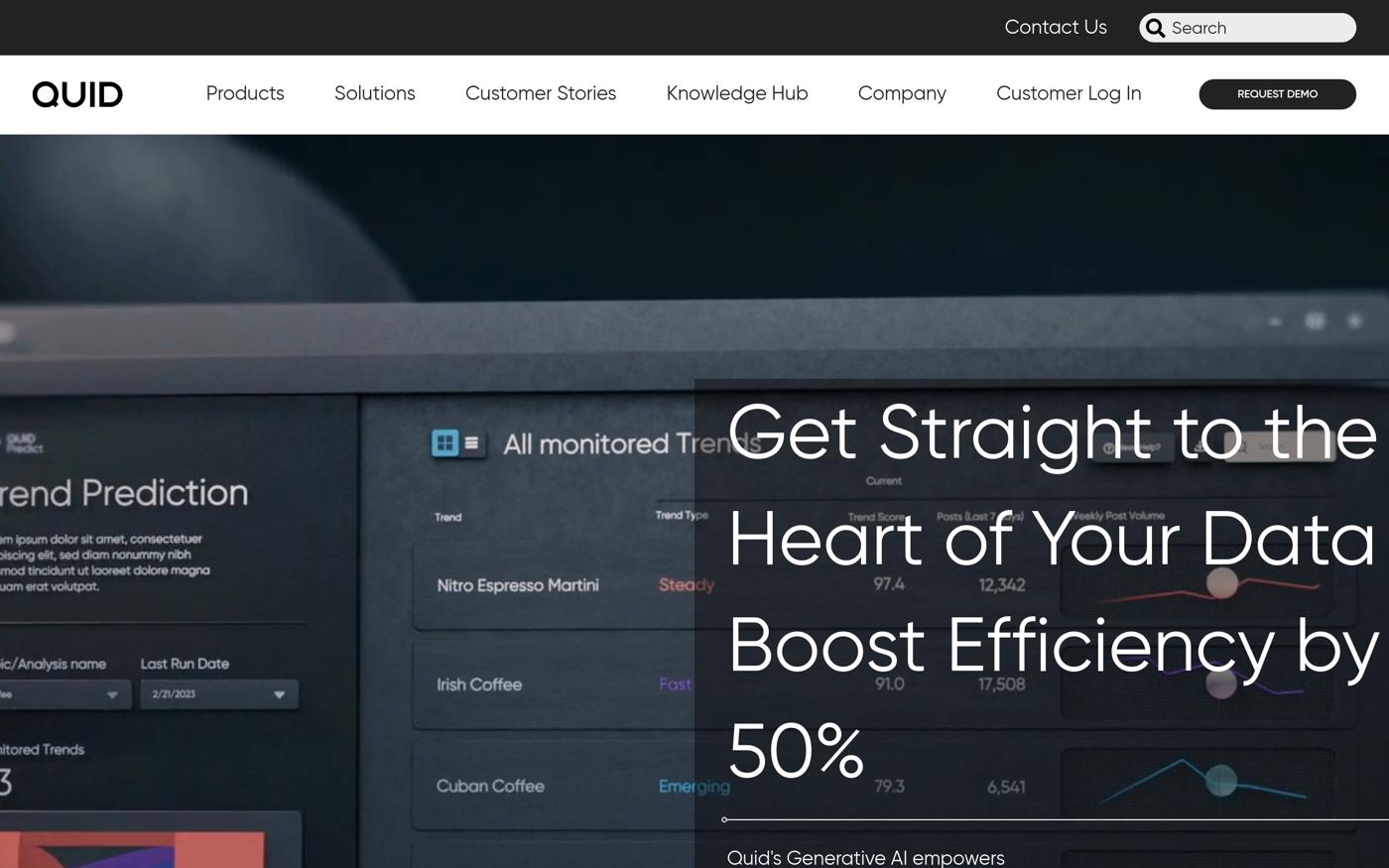
Pros:
- Powerful AI analytics capabilities.
- Intuitive data visualization tools.
- Customizable dashboards for tailored insights.
- Strong focus on consumer sentiment analysis.
- Excellent support resources.
Cons:
- Pricing may be a barrier for small businesses.
- May require time to fully understand all features.
Key Features:
- Data Visualization: Intuitive graphics to interpret complex data easily.
- Consumer Insights: In-depth analysis of consumer behavior and trends.
- Market Monitoring: Continuous tracking of market changes and competitor behaviors.
Pricing:
Quid employs a customized pricing model based on business needs. For specific pricing details, visit the Quid Pricing Page.
2. Sprout Social
Best for social media monitoring and competitive intelligence\
Sprout Social is a robust social media management tool that excels in competitive intelligence and social listening.
With its comprehensive analytics, businesses can gauge their social media performance and make data-driven decisions to enhance engagement and brand loyalty.
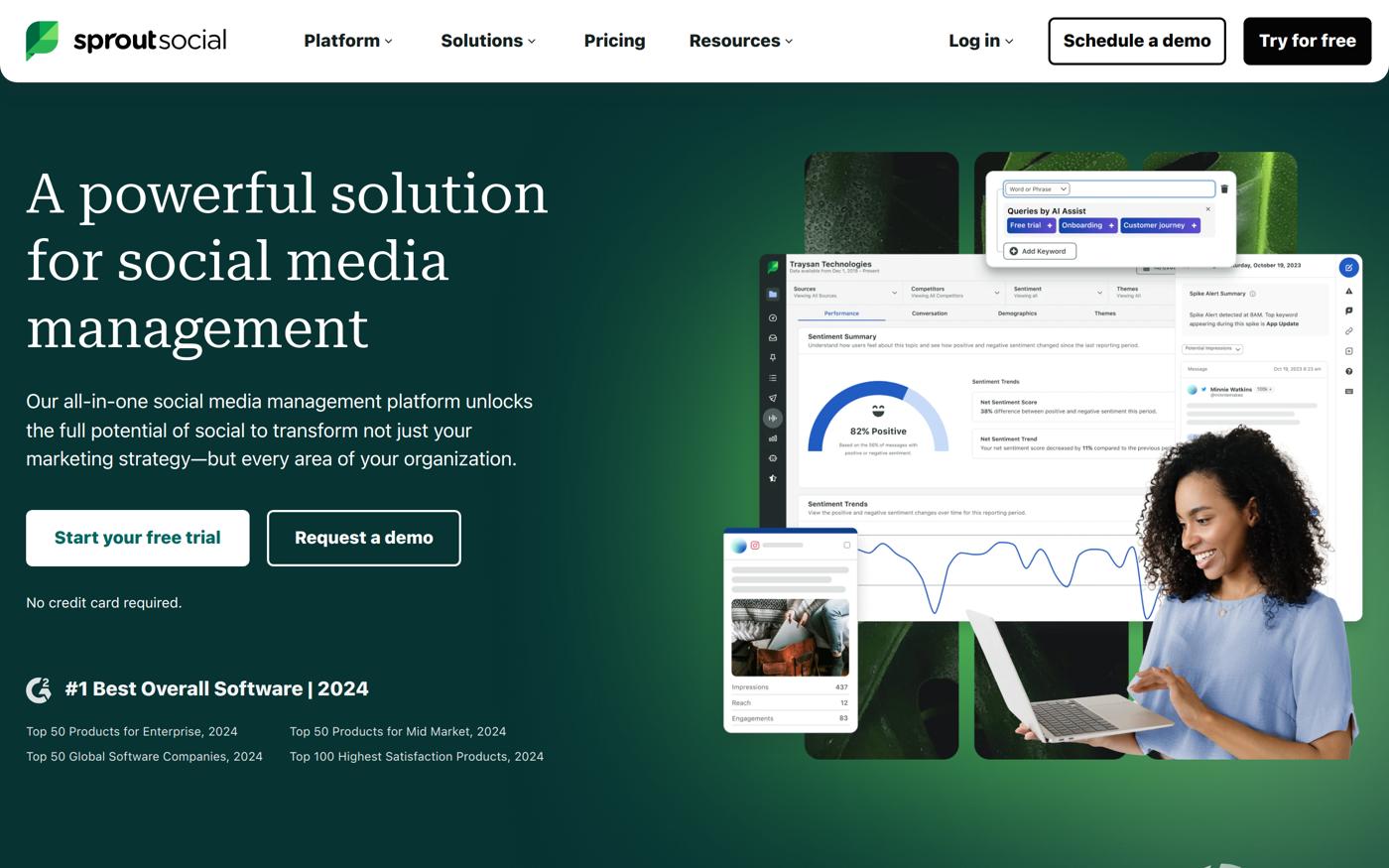
Pros:
- Comprehensive social media analytics.
- User-friendly interface.
- Excellent customer support.
- Strong integration capabilities.
- Advanced reporting features.
Cons:
- Higher pricing compared to some competitors.
- Learning curve for new users.
Key Features:
- Social Listening: Track brand mentions and audience engagement.
- Analytics Reporting: Detailed reports on social media performance.
- Scheduling Tools: Plan and automate social media posts.
Pricing:
Sprout Social offers plans starting at $89/month. For more details, check the Sprout Pricing Page.
3. Semrush
Best for SEO and comprehensive competitive analysis
Semrush is widely recognized for its SEO capabilities but also offers extensive tools for competitive market analysis. Businesses can leverage its features to enhance their online visibility and track competitors effectively.
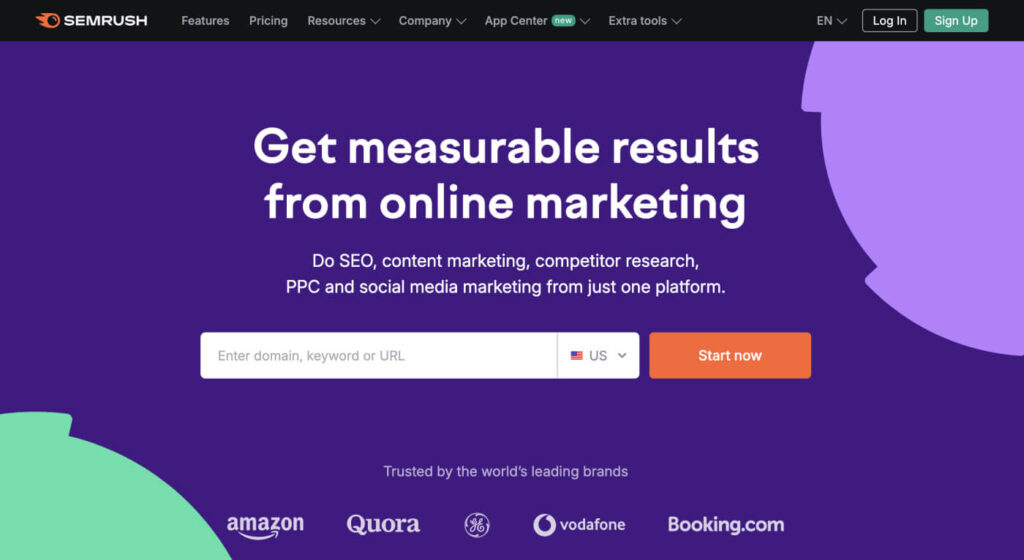
Pros:
- Extensive keyword research tools.
- Comprehensive competitor analysis.
- User-friendly dashboard.
- Regular updates and improvements.
- Great support community.
Cons:
- Can be overwhelming for beginners.
- Pricing may be high for small startups.
Key Features:
- SEO Tools: Comprehensive keyword tracking and analysis tools.
- Traffic Analytics: Insights into website traffic and competitor strategies.
- Content Analysis: Tools for optimizing content for search engines.
Pricing:
Semrush starts at $119.95/month. For detailed pricing options, visit the Semrush Pricing Page.
4. Similarweb
Best for web analytics and market insights
Similarweb provides detailed web analytics that help businesses understand their traffic sources and audience engagement. Its insights are invaluable for companies looking to enhance their online presence and marketing strategies.
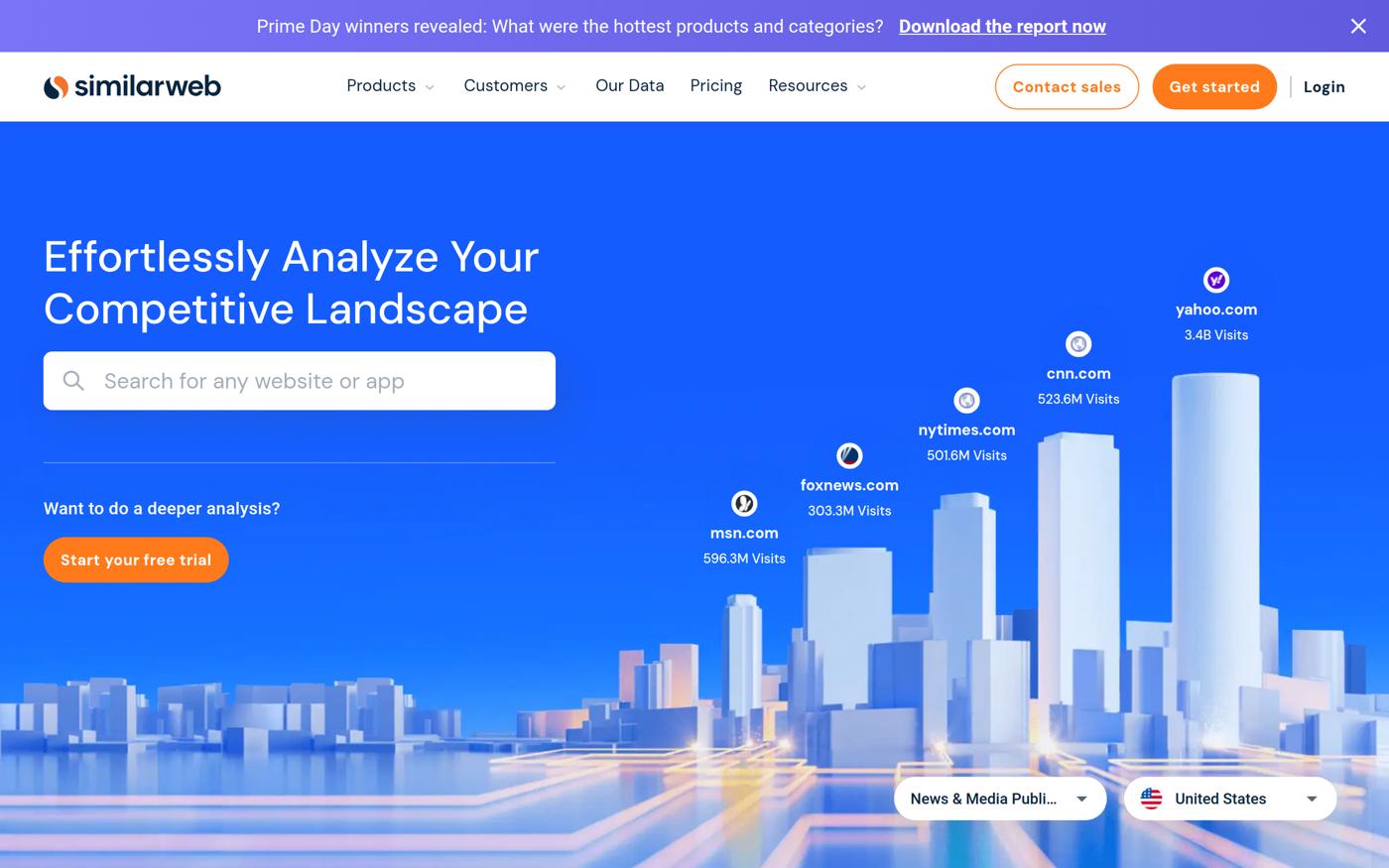
Pros:
- In-depth traffic analysis.
- Easy-to-use interface.
- Valuable competitor insights.
- Regularly updated data.
- Strong visualization tools.
Cons:
- Expensive for small businesses.
- Limited functionality in the free version.
Key Features:
- Traffic Sources Analysis: Insights into where website traffic comes from.
- Audience Insights: Detailed demographics and engagement metrics.
- Competitor Benchmarking: Compare performance against competitors.
Pricing:
Similarweb starts at $199/month. For more details, check the Similarweb Pricing Page.
5. G2
Best for user reviews and comparisons
G2 is a platform that collects user-generated reviews and ratings for various software tools, making it an excellent resource for businesses looking to compare market intelligence tools and make informed purchasing decisions.
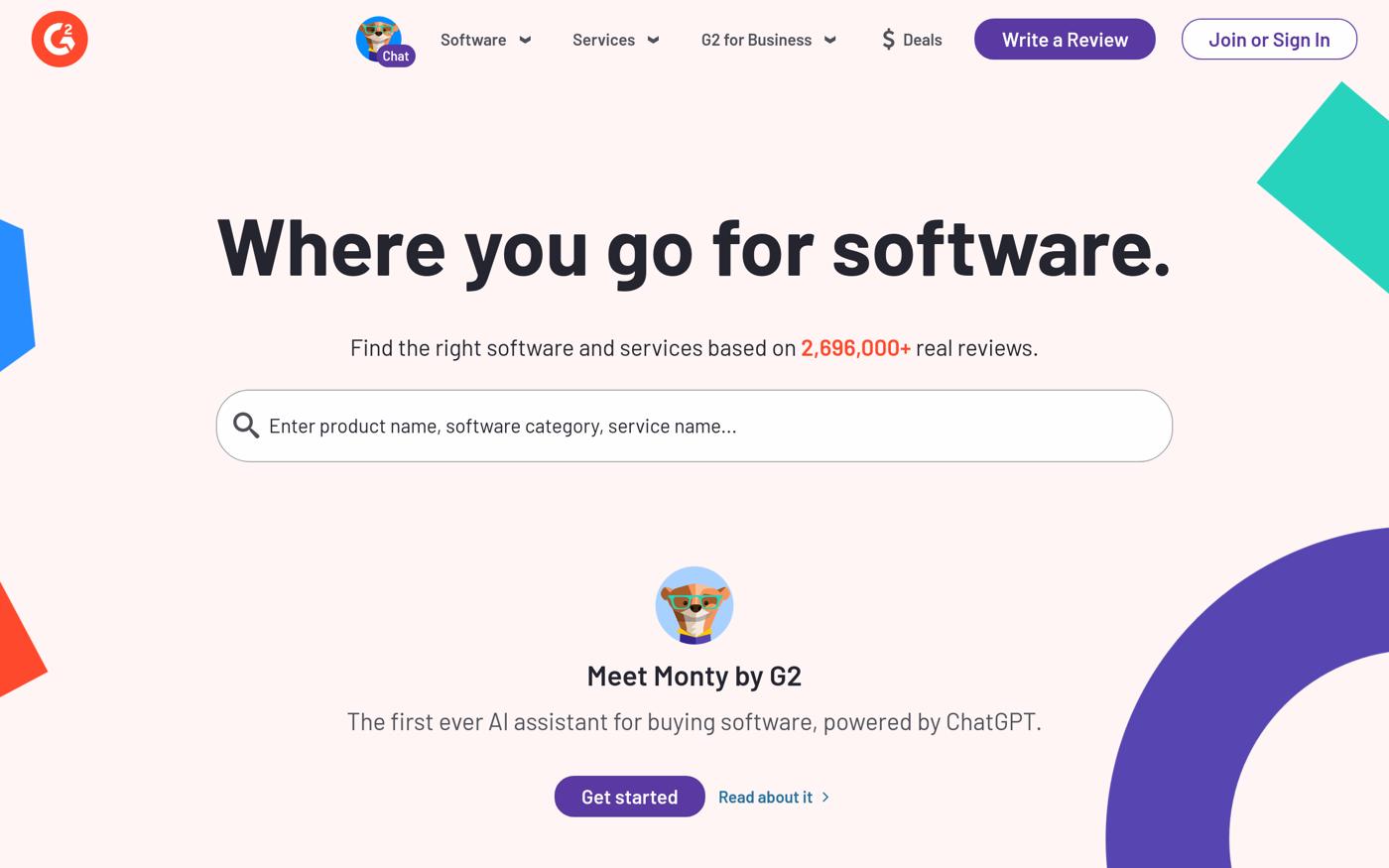
Pros:
- Extensive user reviews and ratings.
- Easy to navigate.
- Regular updates to reviews.
- Comprehensive software comparisons.
- Great community feedback.
Cons:
- Reviews can be subjective.
- Limited in-depth analysis of individual tools.
Key Features:
- User Reviews: Access to thousands of reviews from real users.
- Product Comparisons: Compare features, pricing, and user satisfaction.
- Insights and Reports: Analysis of market trends based on user feedback.
Pricing:
G2 is free to use for users looking for reviews and insights.
6. Statista
Best for extensive statistics across various industries
Statista provides access to a vast array of statistics and reports, making it an essential resource for businesses needing reliable data for market research and analysis.
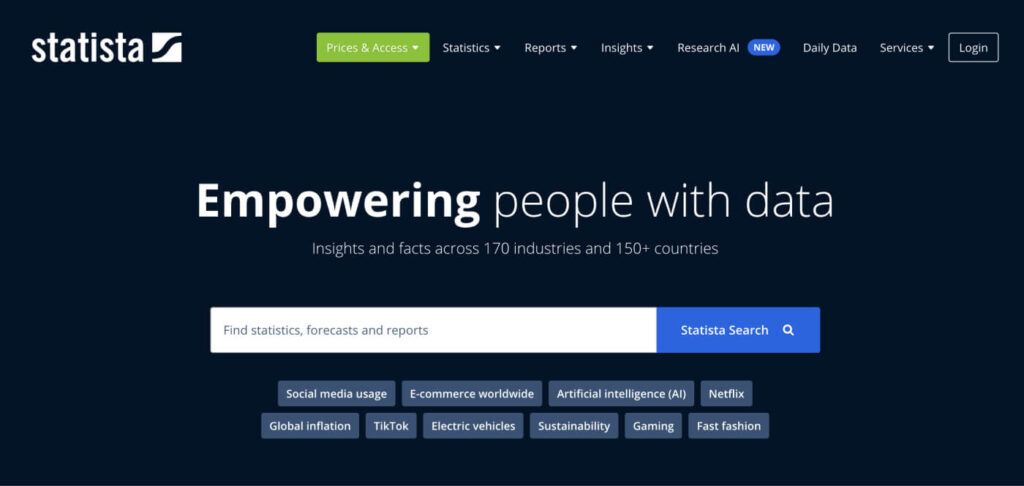
Pros:
- Comprehensive database covering multiple industries.
- Easy to search and filter data.
- High-quality reports and insights.
- Regularly updated statistics.
- User-friendly interface.
Cons:
- Subscription costs can be high.
- Limited free access to certain reports.
Key Features:
- Market Reports: Detailed reports on industry trends and forecasts.
- Data Visualization: Tools to create charts and infographics easily.
- Global Data Access: Data covering over 150 countries.
Pricing:
Statista operates on a subscription basis; pricing varies based on access needs. For details, visit the Statista Pricing Page.
7. Knoema
Best for data visualization and discovery
Knoema specializes in data integration and visualization, allowing businesses to manage and analyze data from various sources without needing extensive coding skills.
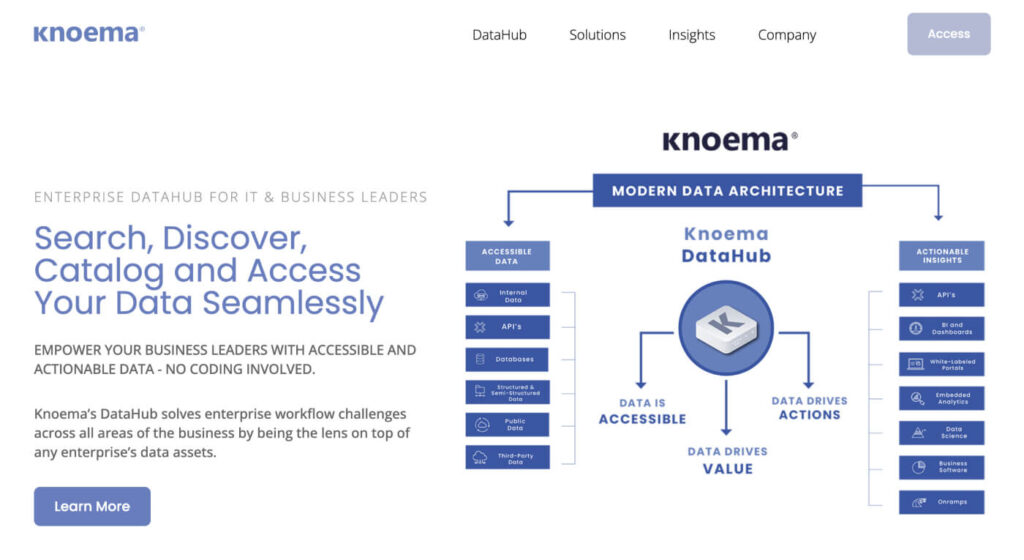
Pros:
- Integrates multiple data sources easily.
- User-friendly visualization tools.
- Customizable dashboards.
- Access to a wide range of datasets.
- Strong community support.
Cons:
- Pricing may vary significantly based on enterprise needs.
- May require some initial setup time.
Key Features:
- Data Integration: Allows for seamless integration of various data sources.
- Visualization Tools: Intuitive tools to create visual data representations.
- Collaborative Features: Share insights and collaborate with team members.
Pricing:
Knoema offers customized plans based on enterprise needs; contact them for more details.
8. NielsenIQ
Best for consumer behavior analytics
NielsenIQ is known for its extensive market research and analytics capabilities, providing businesses with insights into consumer behavior and market trends.
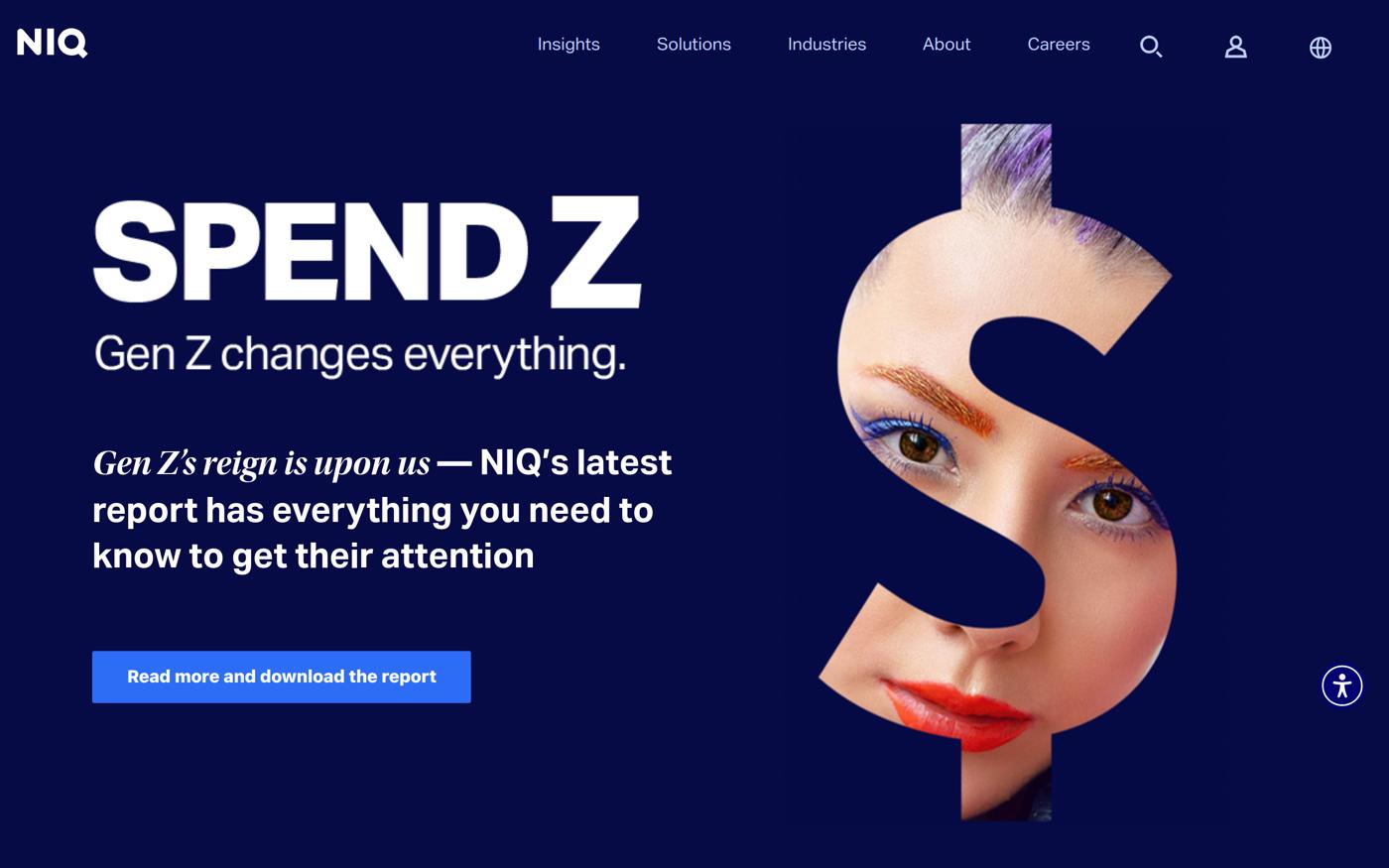
Pros:
- Extensive database of consumer insights.
- Strong analytics capabilities.
- Industry-specific reports and trends.
- Excellent customer service.
- Regular updates and new features.
Cons:
- Higher pricing can limit access for smaller businesses.
- May require training to fully utilize all features.
Key Features:
- Consumer Insights: Detailed analysis of consumer behavior and preferences.
- Market Trends: Reports on current and emerging market trends.
- Retail Insights: In-depth analysis of retail performance.
Pricing:
NielsenIQ’s pricing is available upon request and varies based on service needs.
9. Google Market Finder
Best for identifying untapped global markets
Google Market Finder helps businesses identify new market opportunities by leveraging Google’s vast data resources to provide personalized insights and recommendations.
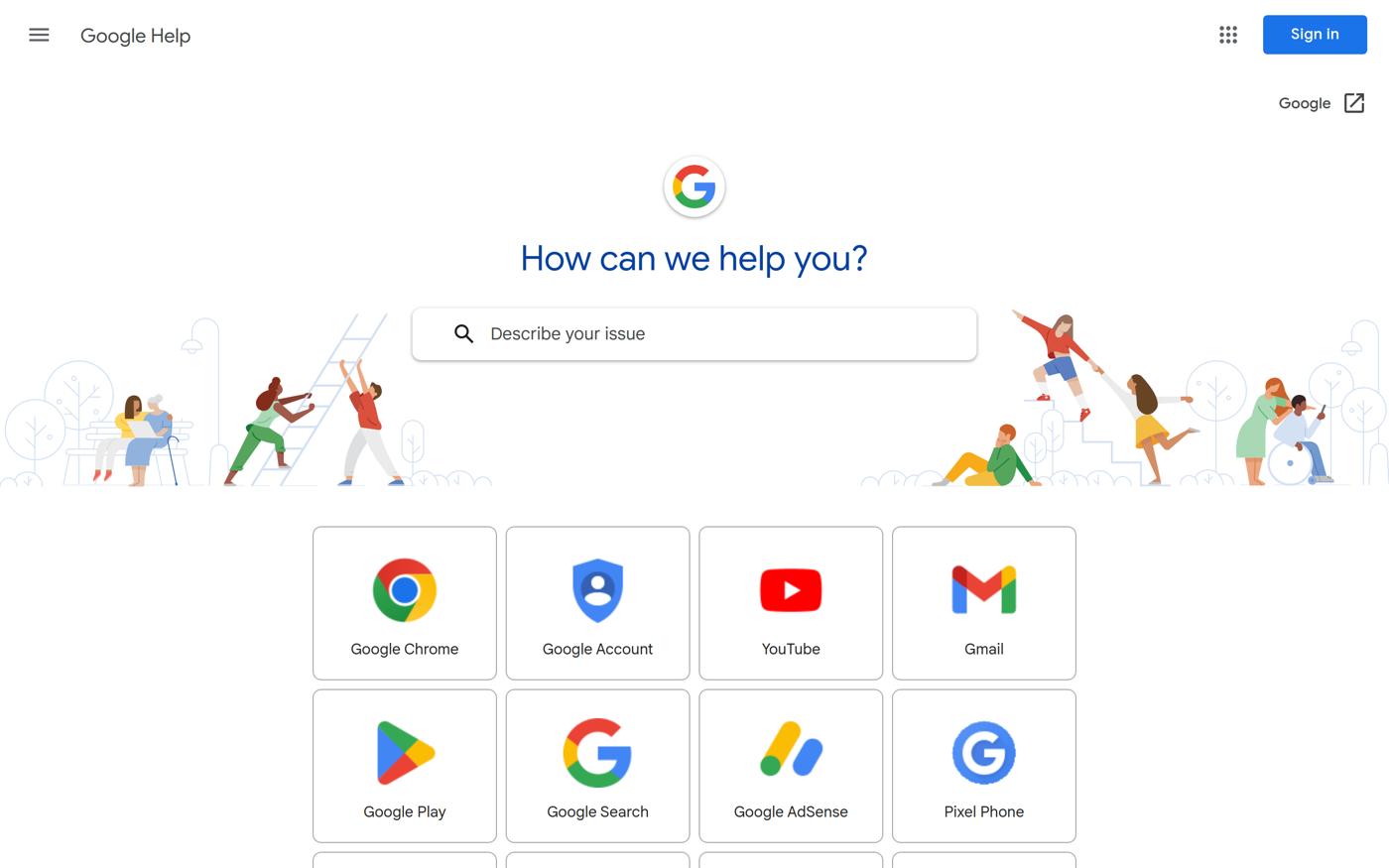
Pros:
- Free to use.
- Personalized insights based on Google data.
- Easy to navigate and use.
- Excellent for market research.
- Provides actionable recommendations.
Cons:
- Limited features compared to paid tools.
- May not cover all industries in detail.
Key Features:
- Market Analysis Tools: Insights into local consumer behavior.
- Personalized Recommendations: Tailored insights based on business needs.
- Global Reach: Access to untapped markets worldwide.
Pricing:
Google Market Finder is free to use.
10. Qualaroo
Best for gathering user feedback through surveys
Qualaroo offers businesses a platform to collect user feedback through customizable surveys embedded in websites or apps, providing real-time insights into user interactions and preferences.
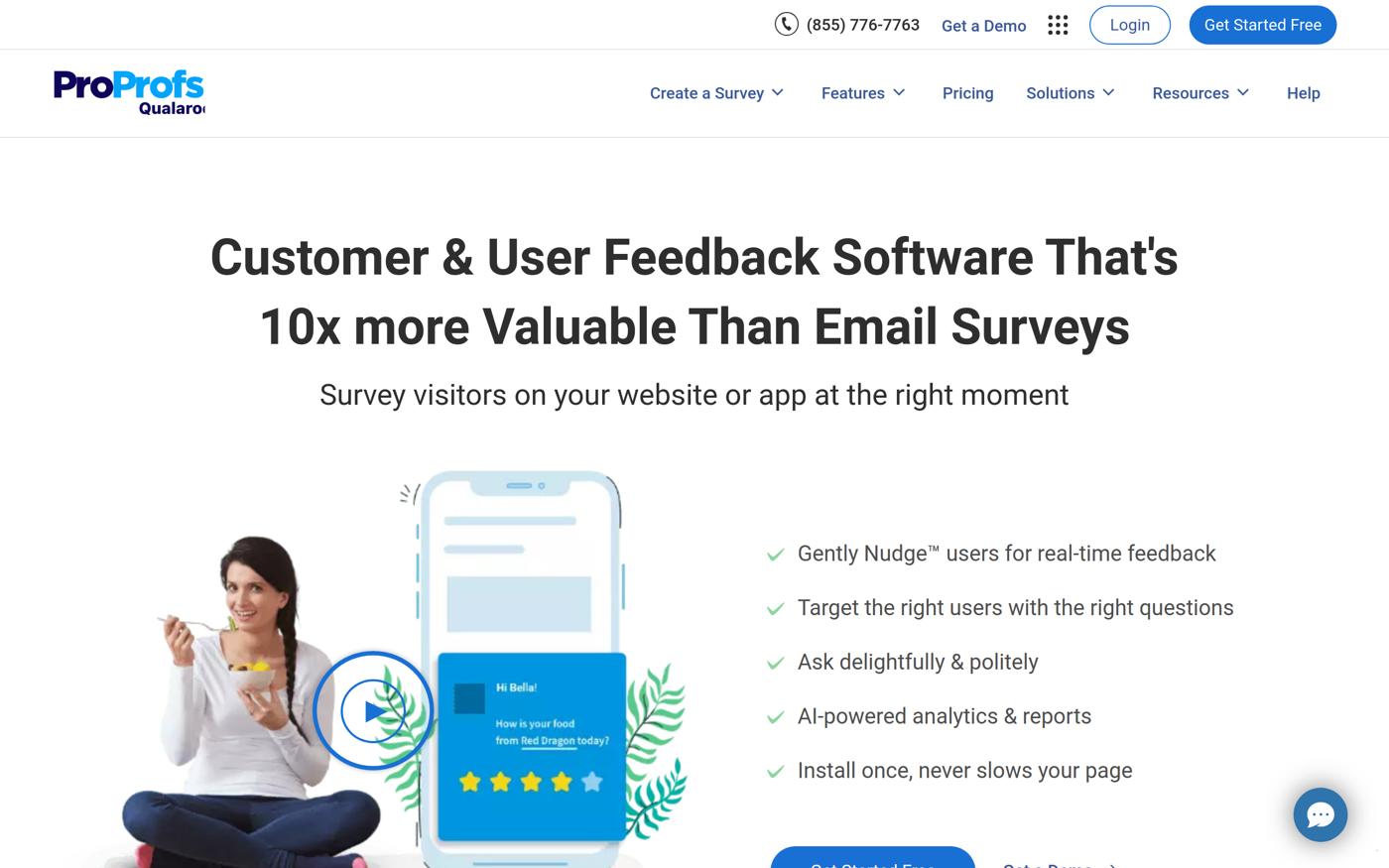
Pros:
- Customizable surveys tailored to user needs.
- Real-time feedback collection.
- User-friendly interface.
- Integration with various marketing tools.
- Strong analytics for survey responses.
Cons:
- Pricing may be steep for small businesses.
- Limited functionality in the free version.
Key Features:
- Survey Tools: Create and deploy surveys easily.
- Real-time Insights: Analyze feedback as it comes in.
- Customization Options: Tailor surveys to specific audiences.
Pricing:
Qualaroo starts at $80/month for its basic plan.
How to Choose the Right Market Intelligence Tools for Your Needs
Selecting the ideal market intelligence tools depends on your specific requirements and use case. Consider these crucial factors:
- Usability: Look for tools that offer an intuitive user experience.
- Data Needs: Ensure the tool provides the data relevant to your industry.
- Integration: Check if the tool integrates seamlessly with your existing systems.
- Budget: Evaluate the pricing structure to find a tool that fits your budget.
Emerging Trends in Market Intelligence Tools
As we look toward the future, several trends are shaping the market intelligence landscape:
- AI Integration: Tools utilizing AI to enhance data analysis and visualization capabilities.
- Real-Time Analytics: Increasing demand for real-time data insights to support timely decision-making.
- Data Privacy Concerns: Growing importance of ethical data usage and privacy considerations in market intelligence.
Conclusion: Making the Right Choice for Your Market Intelligence Tools Needs
Choosing the right market intelligence tools is crucial for informed decision-making. With a variety of options available, businesses must assess their specific needs, budget, and desired features.
Evaluate your requirements and explore our top picks to find the best market intelligence tools that can drive growth and competitive advantage in 2024.
Frequently Asked Questions about Market Intelligence Tools
What are the best market intelligence tools for small businesses?
Small businesses may benefit from tools like Google Market Finder for its free offerings, and Qualaroo for affordable user feedback collection.
How can market intelligence tools improve competitive analysis?
These tools provide insights into competitor strategies, market trends, and consumer behavior, allowing businesses to make data-driven decisions.
What features should I look for in a market intelligence tool?
Key features to consider include user-friendly interfaces, data integration capabilities, real-time analytics, and robust customer support.
Are there free market intelligence tools available?
Yes, tools like Google Market Finder offer free access, while others may provide limited features for no cost.
How do market intelligence tools use AI?
AI is used in these tools to enhance data analysis, automate insights generation, and improve user experiences through personalized recommendations.
Explore the tools mentioned above to find the ones that best suit your needs, and take the first step toward enhancing your market intelligence strategy today!

